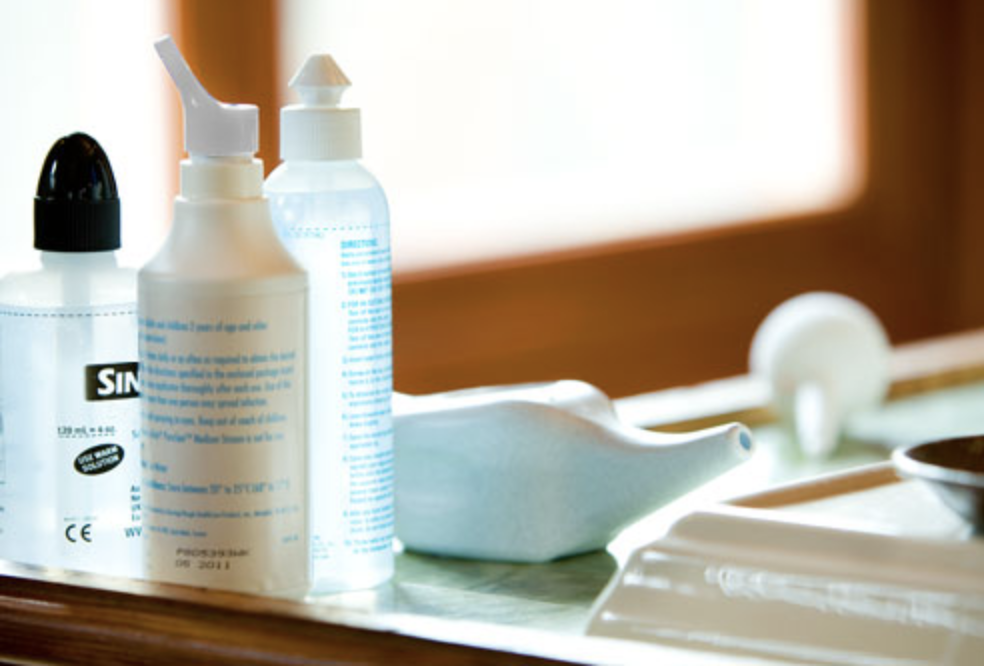Nasal irrigation bottles are used to clean the nasal cavity. Physicians recommend nasal irrigation to treat various sinus conditions. These bottles help to remove dirt, pollen, dust, and other residues; but did you know that they may also harbor bacteria that may reinfect the sinuses upon rinsing?
Several studies reference contamination of irrigation bottles. In this study, researchers collected samples from nasal swabs and nasal irrigation bottles of sinonasal surgery patients. Bacterial growth was found in 29% of the sample bottles. While the cultured bacteria showed no significant infection, it is worth noting that proper cleaning techniques are necessary to prevent further sinus complications.
How to Wash Your Nasal Irrigation Bottle
There are three effective ways to wash your nasal irrigation bottles. The first method includes cleaning with detergent and water. Add water and a small drop of dishwashing detergent to the interior of the bottle then shake vigorously. We also recommend using a bottle and nipple brush to scrub the bottle. After rinsing completely, allow the bottle to air dry on a clean paper towel.
Another effective method of cleaning your bottle is with Milton’s solution. This solution is made up of 1% sodium hypochlorite and 16.5% sodium chloride. It is commonly used for sterilization purposes. You can buy Milton’s solution at your local pharmacy. Be sure to follow the directions provided when sterilizing your nasal irrigation bottle.
You may also use the microwave method to wash your nasal irrigation bottle. Rinse contaminated bottles with tap water plus detergent or tap water followed by microwaving. NeilMed recommends microwaving the bottle parts for at least 40 seconds. When done correctly, this method results in a 100% reduction in bacteria.
When to Replace Your Nasal Irrigation Bottle
Companies recommend replacing your nasal irrigation bottle every three months to minimize bacteria contamination. You should also store it in a cool and dry place with adequate ventilation to prolong use. Be sure to only use your nasal irrigation bottle with previously boiled, distilled, or drinkable water. If your nasal irrigation bottle has come in contact with contaminants, dispose of it immediately.
If you suffer from chronic rhinosinusitis or allergic rhinitis, contact our specialists to learn more about using nasal irrigation bottles to soothe your symptoms. We are available six days a week to care for your allergy and sinus needs. Book an appointment online or call our allergy center today at (212) 686-6321.
Meet the Physician Collaborator
Dr. Shah is a board-certified physician specializing in Adult & Pediatric allergy & immunology. She completed her undergraduate degree in Biology with a concentration in pre-medical from the University of North Carolina at Charlotte. While she was getting her undergraduate degree, she was commended to the Dean’s list and graduated with University Honors. She was also recognized in the Beta Beta Beta, a National Biological Honors Society. Dr. Shah completed medical School in Atlanta, GA where she was recognized as a member of Sigma Sigma Phi, an Honorary Fraternity. She then did her Internal Medicine Residency at Jefferson Health System of NJ. She received her degree in Allergy & Immunology from Nova Southeastern University in Miami, Florida. Dr. Shah has been involved in research since her undergraduate days and is very well published. She has authored and co-authored multiple journal articles. Dr. Shah is also a corresponding author of the Allergy & Immunology board-review book which is read by all physicians certifying and re-certifying for the Allergy & immunology boards.

